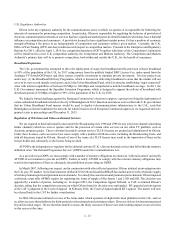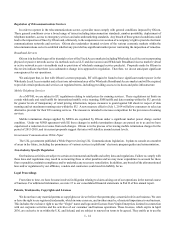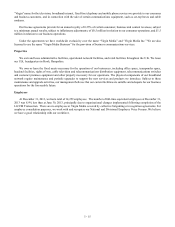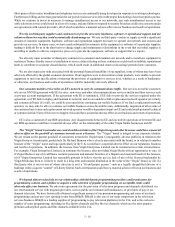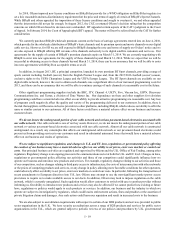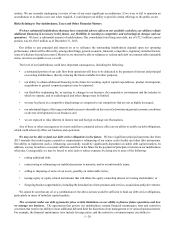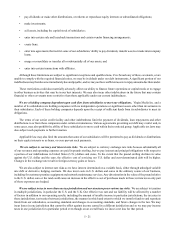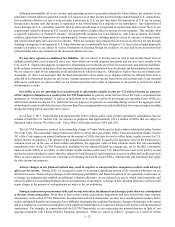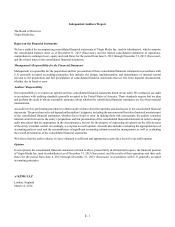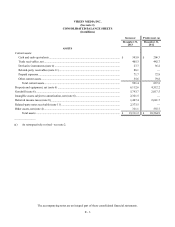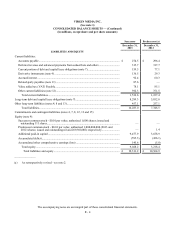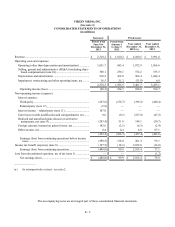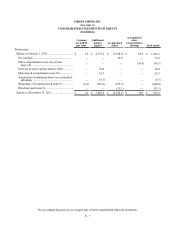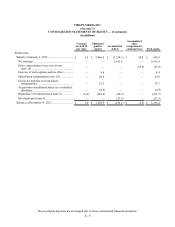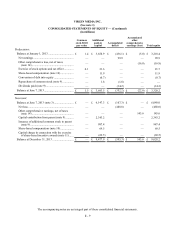Virgin Media 2013 Annual Report Download - page 24
Download and view the complete annual report
Please find page 24 of the 2013 Virgin Media annual report below. You can navigate through the pages in the report by either clicking on the pages listed below, or by using the keyword search tool below to find specific information within the annual report.I - 22
Although substantially all of our revenue and operating income is generated outside the United States, the majority of our
subsidiaries remain subject to potential current U.S. income tax on their income due their being owned through U.S. corporations.
Our worldwide effective tax rate is reduced under a provision in U.S. tax law that defers the imposition of U.S. tax on certain
foreign active income until that income is repatriated to the United States for a majority of our subsidiaries. Any repatriation of
assets through our U.S. ownership currently held by these jurisdictions or recognition of income that fails to meet the U.S. tax
requirements related to deferral of U.S. income tax may result in a higher effective tax rate for our company. This includes what
is typically referred to as “Subpart F Income,” which generally includes, but is not limited to, such items as interest, dividends,
royalties, gains from the disposition of certain property, certain currency exchange gains in excess of currency exchange losses,
and certain related party sales and services income. While the company may mitigate this increase in its effective tax rate through
claiming a foreign tax credit against its U.S. federal income taxes or potentially have foreign or U.S. taxes reduced under applicable
income tax treaties, we are subject to various limitations on claiming foreign tax credits or we may lack treaty protections that
will potentially limit any reduction of the increased effective tax rate.
We may have exposure to additional tax liabilities. We are subject to income taxes as well as non-income based taxes in
multiple jurisdictions, such as payroll, sales, use, value-added, net worth, property and goods and services taxes, mainly in the
U.K. and U.S. Significant judgment is required in determining our worldwide provision for income taxes and other tax liabilities.
In the ordinary course of our business, there are many transactions and calculations where the ultimate tax determination is uncertain.
We are subject to audit by tax authorities in all jurisdictions in which we operate. Although we believe that our tax estimates are
reasonable, (1) there is no assurance that the final determination of tax audits or tax disputes will not be different from what is
reflected in our historical income tax provisions, expense amounts for non-income based taxes and accruals and (2) any material
differences could have an adverse effect on our financial position and results of operations in the period or periods for which
determination is made.
Our ability to use net operating loss carryforwards to offset future taxable income for U.S. federal income tax purposes
will be subject to limitation as a result of the LG/VM Transaction. In general, under Section 382 of the Code a corporation that
undergoes an “ownership change” is subject to limitations on its ability to utilize its pre-change net operating losses (NOLs) to
offset future taxable income for U.S. federal income tax purposes. In general, an ownership change occurs if the aggregate stock
ownership of certain stockholders increases by more than 50 percentage points over such stockholders’ lowest percentage ownership
during the testing period (generally three years).
As of June 7, 2013, Virgin Media had approximately £505.6 million and its dual resident subsidiaries (subsidiaries that are
resident of both the U.S. and the U.K. for income tax purposes) had approximately £521.2 million of NOLs that are subject to
limitation under Section 382 of the Code. These NOLs will expire between 2019 and 2033.
The LG/VM Transaction resulted in an ownership change of Virgin Media and its dual resident subsidiaries under Section
382 of the Code. This ownership change limited our ability to utilize these pre-change NOLs. Upon an ownership change, Section
382 of the Code imposes an annual limitation on the amount of NOLs that may be used to offset future taxable income for U.S.
federal income tax purposes. The amount of the annual limitation generally is equal to the aggregate value of the Predecessor’s
common stock (or, in the case of dual resident subsidiaries, the aggregate value of their common stock) that was outstanding
immediately prior to the LG/VM Transaction, multiplied by the adjusted federal tax-exempt rate, set by the IRS. Limitations
imposed on the ability to use NOLs to offset future taxable income could cause U.S. federal income taxes to be paid by us and
our dual resident subsidiaries earlier than they otherwise would be paid if such limitations were not in effect and could cause such
NOLs to expire unused, in each case, reducing or eliminating the benefit of such NOLs. Similar rules and limitations may apply
for state income tax purposes.
Adverse changes in our financial outlook may result in negative or unexpected tax consequences which could adversely
affect our net income. During 2012, we recognized a gain on reversing a significant portion of the valuation allowance on our
deferred tax assets. Future adverse changes in the underlying profitability and financial outlook of our operations could cause us
to change our judgment and establish an additional valuation allowance on our deferred tax assets, which could materially and
adversely affect our consolidated balance sheets and statements of operations. A change in this valuation allowance will not result
in any change to the amount of cash payments we make to the tax authorities.
Strategic transactions present many risks, and we may not realize the financial and strategic goals that were contemplated
at the time of any transaction. From time to time we have made acquisitions, dispositions and have entered into other strategic
transactions, such as the LG/VM Transaction. In connection with such transactions, we may incur unanticipated expenses, fail to
realize anticipated benefits and synergies, have difficulty integrating the combined businesses, disrupt relationships with current
and new employees, customers and suppliers, incur significant indebtedness, or experience delays or fail to proceed with announced
transactions. For example, in connection with the LG/VM Transaction, we are reassessing our internal structure in light of our
ongoing integration with Liberty Global’s European operations. While we expect to achieve synergies as a result of certain



